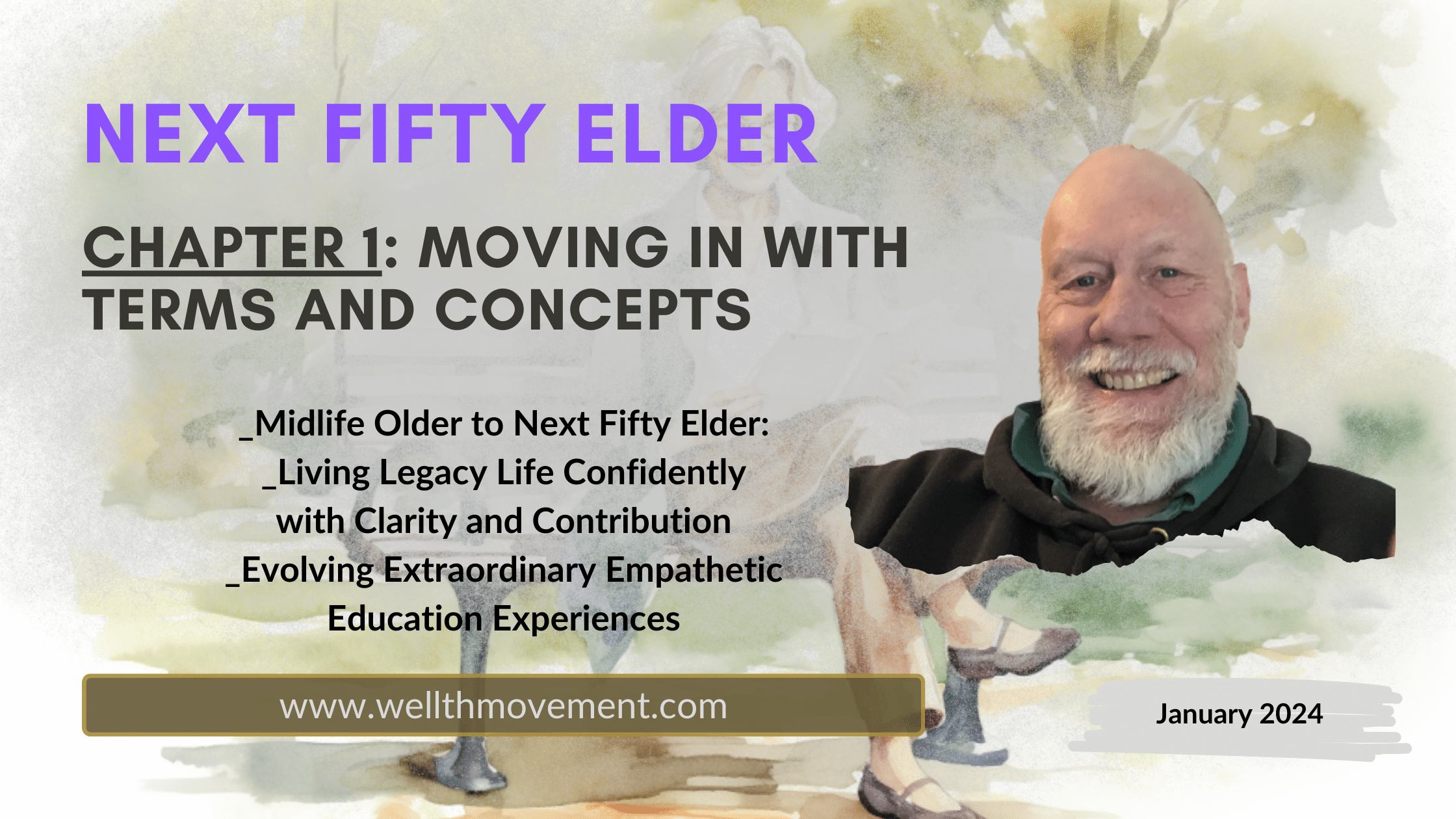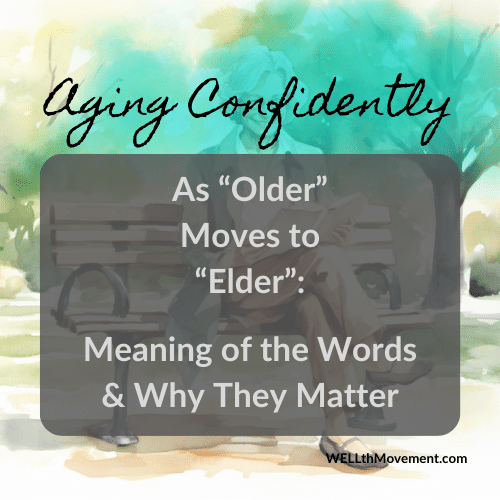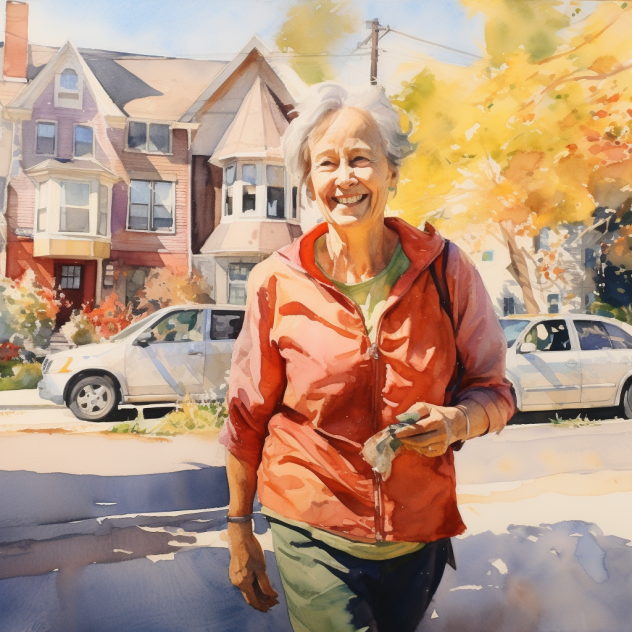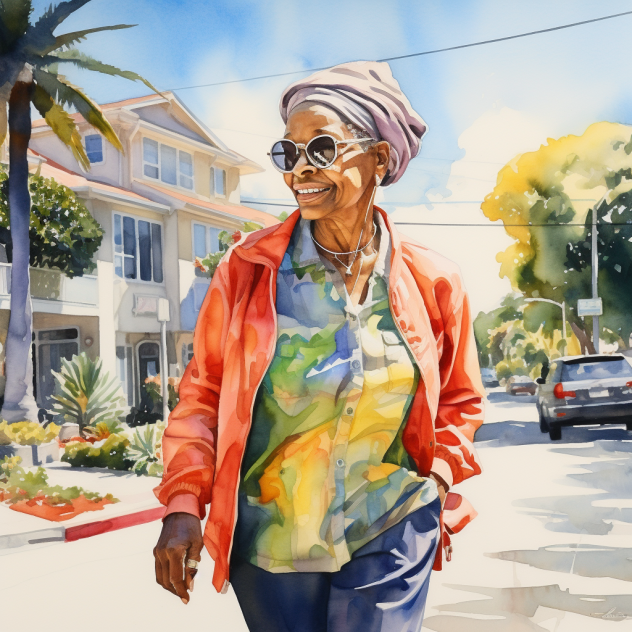Audience: Olders to Elders - SoloAgers
- Empty Nesters - Continuing Educators
- Professionals - Retired Creators
- Grandparents
- Intergenerational Contributors
- and YOU!
Moving In
We wrote this article over the course of 5 days - each morning adding to it.
As “Older” Moves to “Elder”:
Meaning of the Words & Why They Matter
The general definitions for "older" and "elder":
Older: Refers to a comparative stage in the aging process, typically indicating a more advanced age than a reference point. It doesn't necessarily carry a connotation of wisdom or seniority.
Elder: Signifies a stage of life associated with advanced age, often carrying cultural or societal connotations of wisdom, experience, and respect. In many contexts, "elder" is used to denote a person who has attained a position of authority or reverence within a community because of contributions.
Why do the terms "older" and "elder" matter to persons 50+ years old?
These terms carry nuanced meanings that shape self-identity and societal roles, and influence decision making required to live an extraordinary life. Here are 7 reasons why:
1) Identity and Self-Determination:
Older: Implies a chronological age, acknowledging the passage of time.
Elder: Carries a sense of wisdom, experience, and leadership.
2) Contributions to Society:
Older: Focuses on the passage of time without necessarily emphasizing the value of accumulated experience.
Elder: Suggests a person who has valuable insights and contributions to offer based on a lifetime of experiences.
3) Well-being/Well-Living and Aging with Purpose:
Older: Can be perceived as a neutral descriptor of age.
Elder: Encourages individuals to embrace their role with intention, purpose, and a commitment to contribute wisely.
4) Shifting Mindset:
Older: May perpetuate age-related stereotypes and limitations.
Elder: Challenges stereotypes by emphasizing the potential for continued growth, learning, and active engagement.
5) Personal Empowerment:
Older: May evoke a passive acceptance of aging.
Elder: Encourages individuals to see themselves as active participants in shaping their own aging journey.
6) Social and Intergenerational Relationships:
Older: Focuses on age as a numerical value - about years older.
Elder: Promotes intergenerational connections, as elders often serve as mentors and role models - about years elder.
7) Legacy Contributions:
Older: May not inherently emphasize the significance of leaving a meaningful legacy.
Elder: Encourages individuals to consider their impact on future generations and actively shape their legacy.
Define the term "midlife older"
"Midlife older" refers to persons who are in the middle stages of their life, typically ranging from around 40 to 60 years old. Involves a sense of transition, self-reflection, and reevaluation of life priorities.
It's a period where persons may confront various challenges and opportunities, such as shifts in personal and professional roles, family and friend dynamics, and a heightened awareness of aging.
“Midlife Olders” are no longer in the early stages of adulthood. They have options of moving forward to “Next Fifty Elder.”
Define: Next Fifty Elder
"Next Fifty Elder" refers to persons who are transitioning from midlife into the next phase of their lives, typically around the age of 50 and beyond.
It encapsulates the idea that, after reaching the age of 50, persons enter a new stage that goes beyond conventional definitions of middle age. This term emphasizes an optimistic and forward-looking perspective, suggesting that the next fifty years of life hold opportunities for expressing life purpose, learning and educating, and legacy contributions.
"Next Fifty Elders" are those who approach aging with confidence, resilience, and a commitment to living a fulfilling and meaningful legacy life in the later stages of adulthood.
As “Midlife Older” Moves to “Next Fifty Elder”:
Meaning of the Words & Why They Matter
Along the path of "Midlife Older" to "Next Fifty Elder," the words we use carry profound significance, shaping our perceptions and opinions, and assumptions and beliefs. Valuing their meanings is crucial for navigating this transition with awareness (intention and attention) and conscious responsiveness.
Midlife Older:
Meaning: The phase in life occurring around the midpoint of the average human lifespan.
Significance: Represents a stage of reflection, potential reevaluation, and preparation for the next phase.
Moves:
Meaning: Indicates a transition or progression from one state to another.
Significance: Implies an active and intentional process, suggesting a forward momentum in life.
Next Fifty Elder:
Meaning: Refers to the upcoming period of fifty years, typically beyond the midlife stage.
Denotes a person of advanced age, often associated with wisdom, experience, and leadership.
Significance: Marks a significant portion of one's life, offering opportunities for new experiences, growth, and achievements–accomplishments.
Carries cultural and societal respect, symbolizing a phase where one may take on mentorship roles and contribute to the well-living of the community.
Meaning:
Meaning: The interpretation or significance attributed to words, actions, or concepts.
Significance: Emphasizes the importance of understanding the deeper implications of our decisions and expressions as we transition from midlife to the next fifty.
Words Matter:
Meaning: Units of language used to convey thoughts, ideas, and emotions.
Holds significance or importance.
Significance: Acknowledges the power of language in shaping our reality, influencing perceptions, and fostering meaningful connections.
Highlights the relevance of these words in influencing mindset, guiding actions, and shaping the narrative of one's aging journey.
Recognizing the nuances of the words–at this junction of the article–enables persons to navigate the “older to elder”, “midlife older to next fifty elder” transition with clarity, purpose, and a conscious embrace of the richness inherent moving forward along the path of their journeys.
Knowing these terms and their meaning sets up two ways of furthering their use in appreciating and celebrating the importance of “story” and “shift” in the older to elder movement.
Background Explanation–Description of Story, Story-Telling & Story-Sharing
Story: A narrative or account of events, experiences, or the like, whether true or fictitious. Stories often have a beginning, middle, and end and are used to convey information, entertain, and/or share insights.
Storytelling: The art or technique of narrating a story, often with an engaging and compelling delivery. Storytelling involves the use of words, images, or other mediums to convey a narrative, capturing the attention and imagination of the audience.
Story-Sharing: The act of conveying a story with others, often involving the intentional sharing of personal experiences, anecdotes, or narratives. Story-sharing emphasizes the communal aspect of storytelling, where individuals exchange their stories with the purpose of connecting, inspiring, or fostering understanding among each other.
Older to Elder Story: The Essence of Narrative Expansion and Extension
Story: Along our journey from midlife older to the next fifty elder, a story highlights the rich elements/essences of our experiences, both factual and fictional. It's the unfolding narrative of our lives, marked by distinct chapters—our own unique odyssey.
Storytelling: Picture sitting by the fire, sharing the chapters of your life, seamlessly blending truth and imaginative embellishment. Storytelling for the midlife older transitioning to the next fifty elder is an art. It's the captivating delivery of one's narrative, a learnable skill, binding us together in managing human experience.
Story-Sharing: As we transition from midlife older to next fifty elder, story-sharing becomes the communal heartbeat of our legacy. It's the intentional act of unveiling personal chapters, inviting others into the sacred space of our memories. Through story-sharing, we weave connections, inspiring, and fostering a deep understanding among fellow travelers on the aging journey. Through story we lead others to their awareness of moving forward along their life path.
In this ageless exchange, terms like "story," "storytelling," and "story-sharing" transform from mere definitions to living entities. Stories become the bridges connecting generations, storytelling evolves into the eloquent expression of managing life's journey, and story-sharing emerges as the heartbeat for leading (self and) others to their decision-making about actions and outcomes.
In the older to elder story, every term is a brushstroke, painting the canvas of a legacy that transcends time, connecting the midlife older to the next fifty elder in an ever-expanding narrative of wisdom, resilience, and reverence as seasonings of the main course of shared humanity.
Shift and Transition: When Moving Between "Midlife Older" to "Next Fifty Elder"
The phrase "shift and transition" refers to the significant pivots, corrections, and adjustments that persons experience as they move from the phase of "midlife older" to becoming a "next fifty elder." It implies a transitional process where persons undergo shifts in various aspects of their lives, encompassing personal growth, priorities, perspectives, and lifestyle. The three types of transition are transaction, transformation, and transcendence.
During the transition from midlife to the next fifty, individuals often reevaluate their goals for self and outcomes with others, and their hierarchy of values and meaningful/impactful aspirations.
They may experience a shift in their mindset, embracing new perspectives on aging, purpose, and well-being/well-living. This transition involves adapting through adopting and adapting to the evolving circumstances, challenges, and opportunities that come with entering a new stage of life.
"Shift and transition" suggests that the journey from midlife to the next fifty is not a static progression. It’s a dynamic and evolving process.
It acknowledges that individuals may need to navigate decision edits (what to add, alter, delete) in relationships, career paths, and personal identity.
The phrase encapsulates the idea that this “older to elder” transition involves
- physical
- mental/emotional
- soulful
- spiritual
- wholversical
shifts, as well as practical adjustments in lifestyle and consequence agreement and/or acceptance.
Definition and Importance of These Terms:
Evolving Extraordinary Empathetic Education Experiences
To Support the Older to Elder Narrative - Storytelling and Story-Sharing
To Guide the Midlife Older to Next Fifty Elder Shift and Transition
Together, these five words create a narrative of a journey marked by growth, meaningful connections, a commitment to ongoing learning, and the accumulation of valuable life experiences.
Evolving: Encouraging continuous development and transformation over time, adapting to new circumstances, and gaining insights through experience, learning, and personal growth.
Companion to Growth: "Evolving" signifies continuous development and growth. Along the pathway from older to elder, the term reflects the ongoing process of personal and experiential growth, emphasizing that individuals are not static but constantly evolving.
Extraordinary: Going beyond the ordinary; exceptional, remarkable, or outstanding in a unique and impressive way, often involving experiences that surpass common expectations and norms.
Companion to Significance: "Extraordinary" suggests going beyond the ordinary and mundane. As individuals progress along the pathway, the term implies a commitment to creating a life that is remarkable, meaningful, and goes beyond the commonplace.
Empathetic: Demonstrating empathy, the ability to understand and share the feelings of others, showing compassion, sensitivity, and a genuine connection to the emotions of those around you.
Companion to Connection: "Empathetic" highlights the importance of understanding and connecting with others on a deeper level. Along the pathway, empathy becomes a crucial companion, fostering meaningful relationships and a sense of shared understanding with fellow individuals.
Education: Acquiring knowledge, skills, values, and attitudes through formal or informal methods, contributing to personal development, understanding, and intellectual growth.
Companion to Learning: "Education" serves as a lifelong companion, emphasizing the continual pursuit of knowledge and wisdom. Along the pathway, a commitment to ongoing learning ensures that individuals stay engaged, informed, and adaptable in the face of evolving circumstances.
Experiences: Crafting events or occurrences that leave an impact on an individual, shaping
perspectives, influencing personal growth, and contributing to a person's overall understanding and interpretation of life.
Companion to Wisdom: "Experiences" encapsulate the accumulation of life's lessons and wisdom. Along the pathway, valuing diverse experiences becomes a companion to personal growth, enriching one's understanding of the world and contributing to the legacy one leaves behind.
Connecting the Currency Of Confidence with Midlife Olders to Next Fifty Elders
Aging: Aging is a natural, ongoing process of shift, transition, and development that occurs throughout a person’s life. It involves physical, psychological, and social transformations, often marked by milestones and experiences associated with time and location.
SoloAging: SoloAging refers to the experience of aging without the traditional support structures of a spouse, children, or close family members. SoloAgers navigate the aging journey independently, relying on their own resources and networks for support.
Confidence: Confidence is a state of self-assurance and belief in one's abilities, skills, and judgment. It involves a positive mindset, resilience in the face of challenges, and a sense of assurance in decision-making and navigating life's complexities.
Importance of Confidence to Agers and SoloAgers: Confidence plays a crucial role in the aging process, providing individuals with the mental and emotional strength to face the changes and uncertainties associated with getting older. For SoloAgers, confidence becomes vital as they navigate the challenges of aging without the traditional familial support.
Aging Confidently: Aging confidently involves approaching the aging process with a positive mindset, embracing one's evolving identity, and having the resilience to overcome obstacles. It means making informed decisions, fostering a sense of control, and finding purpose and fulfillment in the later stages of life.
SoloAging Confidently: SoloAging confidently extends this concept to individuals aging without the traditional family support. It emphasizes building a strong sense of self-reliance, creating supportive networks, and proactively addressing the unique challenges faced by those aging alone.
Link to Midlife Older to Next Fifty Elder: The transition from Midlife Older to Next Fifty Elder involves a shift in perspective and priorities. Confidence becomes a guiding force during this transition, helping individuals embrace the shifts, cultivate resilience, and approach the later stages of life with an empowered mindset. For SoloAgers, confidence is a key factor in crafting a fulfilling and self-sufficient aging journey.
Define the Terms: Living, Legacy, Life, and Living Legacy Life
with confidence, consistency, and commitment
without wasting time, effort, and money
Explain the phrase "Living Legacy Life"
Living... refers to the active, intentional, and purposeful engagement with life. It involves being present in the current moment, making conscious choices, and continuously evolving through experiences and personal growth.
Legacy... denotes the impact, contributions, and meaningful imprint that an individual leaves behind for future generations. It encompasses the values, wisdom, accomplishments, and shared experiences that shape the narrative of one's existence and influence the world beyond their lifetime.
Life... encompasses the entire span of an individual's existence, from birth to death. It emphasizes the ongoing journey of living with purpose, meaning, and fulfillment, recognizing that every moment contributes to the creation of a meaningful legacy.
Together, "Living Legacy Life"
- signifies a conscious and intentional approach to life, where individuals actively shape their experiences, relationships, and contributions to leave a lasting legacy that reflects their values and positively influences the lives of others.
- emphasizes the interconnectedness of living in the present moment, creating a meaningful legacy, and embracing the continuous evolution that comes with a purposeful life journey.
- refers to the intentional and meaningful way of living that involves creating, embodying, and sharing a legacy throughout one's lifetime.
- encompasses a conscious and purposeful approach to daily actions, decisions, and relationships, encouraging a clear and lasting impact on oneself, others, and for the world.
- involves the continuous cultivation of experiences, values, and contributions that contribute to a meaningful and fulfilling existence, transcending conventional notions of aging and leaving a legacy only after death.
- emphasizes the active engagement in shaping a legacy in real-time, aligning personal values with actions, and fostering connections with others through shared experiences and wisdom.
Explain the phrase "with confidence, consistency, and commitment" in context to Living Legacy Life
Accompanying the Living Legacy Life phrase is another phrase "with confidence, consistency, and commitment." This second phrase underscores the essential qualities and principles that guide individuals in their journey of intentionally shaping and living a meaningful legacy.
Confidence refers to the assurance and self-belief necessary for persons to embrace their unique path in aging and legacy-building. Confidence empowers decision making, aligned with a person's hierarchy of values and their risk assessments. With it, a person willingly shares their experiences openly, contributing to the creation of a robust and authentic legacy.
Consistency highlights an ongoing effort to align daily actions with the intended legacy. Consistency implies a dedication to embodying one's values, maintaining reasonable behaviors that contribute to the long-term impact one wishes to leave. It involves a steadfast commitment to the principles and outcomes established for the legacy.
Commitment speaks to the dedication and resolve required to sustain the journey of living a legacy. It involves staying true to one's values, purpose, and the well-being of oneself and well-living with others. Commitment implies a long-term perspective, weathering challenges with resilience, and actively working towards the outcomes set for the legacy.
Together, these three elements form a powerful foundation for Living Legacy Life.
- Confidence provides the courage to start and maintain the journey
- Consistency ensures meaningful and lasting actions over time
- Commitment fuels the perseverance needed to navigate challenges
- All three together maintain the truth, worth, and utility of the legacy vision
Explain the phrase "without wasting time, effort, and money" in context to Living Legacy Life
The phrase "without wasting time, effort, and money" underscores the importance of efficiency, purposeful action, and resource management while shaping and sharing a meaningful legacy.
Time awareness/action management encourages individuals to be intentional with their time, focusing on activities and pursuits that align with their values and contribute to the legacy they want to leave. Avoiding time-wasting activities allows for a more purposeful and fulfilling journey, ensuring that every moment contributes meaningfully to the creation of one's legacy.
Wasting effort on activities that do not align with the intended legacy can be counterproductive. Living a legacy life involves directing energy and effort toward actions that positively impact oneself and others. This may include fostering relationships, engaging in meaningful projects, and sharing experiences that contribute to the overall well-being for self and each contributor and the well-living of legacy with the recipients (all stakeholders).
Money, your financial resources are valuable tools in shaping a legacy, but wasting money on endeavors that do not align with one's values or contribute meaningfully to the legacy can be detrimental. Living Legacy Life involves wise financial decisions, allocating resources purposefully, and avoiding unnecessary expenditures that do not align with the intended impact.
By emphasizing the avoidance of waste in time, effort, and money, individuals can optimize their journey toward living a legacy. This approach encourages thoughtful decision-making, strategic planning, and a focus on the activities that truly matter. It aligns with the principles of mindfulness and intentionality, ensuring that for each resource—whether time, effort, or money—you invest in them wisely to create a lasting and impactful legacy. [You here, refers to you as a person with all stakeholders.]
Do you have edits (something to add, alter, delete)?
Would appreciate your comments! Use the form below ))smiles
Audience: Olders to Elders - SoloAgers - Empty Nesters - Continuing Educators - Professionals -
Audience: Olders to Elders - SoloAgers - Empty Nesters - Continuing Educators - Professionals -
Audience: Olders to Elders - SoloAgers - Empty Nesters - Continuing Educators - Professionals -
Audience: Olders to Elders - SoloAgers - Empty Nesters - Continuing Educators - Professionals -
Audience: Olders to Elders - SoloAgers - Empty Nesters - Continuing Educators - Professionals -
Audience: Olders to Elders - SoloAgers - Empty Nesters - Continuing Educators - Professionals -







